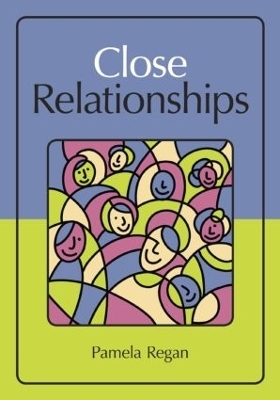
Close Relationships
Routledge (Verlag)
978-0-415-87743-5 (ISBN)
Active learning is encouraged throughout. Each chapter includes an outline to guide students, key terms and definitions to help identify critical concepts, and exploration exercises to promote active thinking. Many chapters include measurement instruments that students can take and score themselves. A website for instructors features a test bank with multiple-choice and essay questions and Power Points for each chapter.
This text distinguishes itself with:
Its focus on family and friend relationships as well as romantic relationships.
Its multidisciplinary perspective highlighting the contributions to the field from a wide array of disciplines.
Its review of the relationship experiences of a variety of people (of different age groups and cultures; heterosexual and homosexual) and relationship types (dating, cohabiting, marriage, friendships, family relationships).
Its focus on methodology and research design with an emphasis on how to interpret empirical findings and engage in the research process.
Cutting-edge research on "cyber-flirting" and online relationship formation; the biochemical basis of love; communication and social support; bullying and peer aggression; obsession and relational stalking; sexual violence (and marital rape); and grief and bereavement.
The book opens by examining the fundamental principles of relationship science along with the research methods commonly used. The uniquely social nature of humans is then explored including the impact relationships have on health and well-being. Part 2 focuses on relationship development—from attraction to initiation to development and maintenance as well as the factors that guide mate choice and marriage. The development of relationships in both friendships and romantic partnerships is explored. Part 3 examines the processes that shape our interpersonal experiences, including cognitive (thinking) and affective (feeling) processes, communicative and supportive processes, and the dynamics of love and sex. The book concludes with relationship challenges—rejection and betrayal; aggression and violence; conflict and loss; and therapeutic interventions.
Intended as a text for courses in interpersonal/close relationships taught in psychology, communication, sociology, anthropology, human development, family studies, marriage and family therapy, and social work, practitioners interested in the latest research on personal relationships will also appreciate this engaging overview of the field.
Pamela Regan is Professor of Psychology at California State University, USA. She received her Ph.D. in Psychology from the University of Minnesota, USA. Her research interest is in the area of interpersonal relationships, with an emphasis on passionate love, sexual desire, and mate preference. She has published more than 100 articles, chapters, and reviews; has given over 75 presentations; and is the author of The Mating Game: A Primer on Love, Sex, and Marriage (Sage, 2008) and the co-author (with Ellen Berscheid) of The Psychology of Interpersonal Relationships (Pearson, 2005) and Lust: What We Know About Human Sexual Desire (Sage, 1999). In 2007, she was honored with the Outstanding Professor Award by her university for excellence in instruction and professional achievement.
Part 1. Principles of Relationship Science 1. Basic Facts and Key Concepts. 2. Research Methods. 3. Our Social Nature. Part 2. Relationship Development 4. Relationship Beginnings. 5. Relationship Initiation. 6. Relationship Development. 7. Mate Selection and Marriage. Part 3. Relationship Processes 8. Thinking and Feeling. 9. Communicating and Supporting. 10. Loving. 11. Sexing. Part 4. Relationship Challenges 12. Rejection and Betrayal. 13. Aggression and Violence. 14. Conflict and Loss. 15. Intervention.
| Erscheint lt. Verlag | 4.2.2011 |
|---|---|
| Verlagsort | London |
| Sprache | englisch |
| Maße | 178 x 254 mm |
| Gewicht | 861 g |
| Themenwelt | Geisteswissenschaften ► Psychologie ► Sozialpsychologie |
| Mathematik / Informatik ► Mathematik | |
| Sozialwissenschaften ► Soziologie | |
| ISBN-10 | 0-415-87743-1 / 0415877431 |
| ISBN-13 | 978-0-415-87743-5 / 9780415877435 |
| Zustand | Neuware |
| Informationen gemäß Produktsicherheitsverordnung (GPSR) | |
| Haben Sie eine Frage zum Produkt? |
aus dem Bereich


